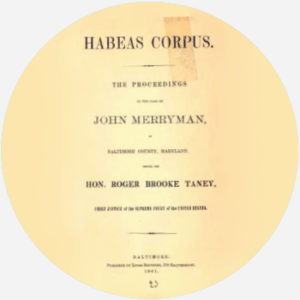Politics dictionary
writ of habeas corpus
or habeas corpus [thuh] [rit] [ov] [hey-bee-uh s kawr-puh s]
What does writ of habeas corpus mean?
The writ of habeas corpus, often shortened to habeas corpus, is the requirement that an arrested person be brought before a judge or court before being detained or imprisoned.
Where does writ of habeas corpus come from?

Attested as an English legal borrowing by the 1460s, habeas corpus literally means in Latin “you shall have the body,” or person, in court, and a writ is a formal order under seal, issued in the name of a sovereign, government, court, or other competent authority. So, a writ of habeas corpus is a court order to bring a person who’s been detained to court to determine whether or not their detention is valid. It’s a failsafe to prevent the government from imprisoning people without cause.
The writ of habeas corpus originated in Medieval English common law. It’s difficult to say exactly where it first appeared in writing, but it was most famously codified in the 1215 Magna Carta, which granted all free men protection against illegal imprisonment. This English law was brought over to the North American British colonies. In turn, the US Constitution, which was influenced by the Magna Carta, explicitly charges: “The Privilege of the Writ of Habeas Corpus shall not be suspended, unless when in Cases of Rebellion or Invasion the public Safety may require it.” Many other modern countries include writs of habeas corpus in their constitutions.
In 1863, President Abraham Lincoln famously used an executive order during the Civil War to suspend the writ of habeas corpus to keep Maryland, and important train routes between Washington, DC and the North, from falling to Confederate sympathizers. Because the Constitution allows for suspension in the event of rebellion, Lincoln was within rights to do this (England had also suspended the writ during past emergencies). Still, the decision was controversial, as it meant those suspected of being associated with the Confederacy could be imprisoned without trial.
The writ of habeas corpus was also suspended in some instances in World War II, notably by the governor of Hawaii after the attack on Pearl Harbor. In the 2010s, the writ has been the subject of much legal dispute over the detention of suspected terrorists, especially concerning the detainees held in Guantánamo Bay without charge. In 2008, the Supreme Court found the Military Commissions Act of 2006 unconstitutional, which President Bush signed into allowing for the detention of “unlawful enemy combatants” against the US.
In common legal practice, the writ of habeas corpus is invoked in cases where someone believes they’ve been wrongly detained. This applies to both people in prisons and people who are in mental institutions. Essentially, one could petition the court for a writ of habeas corpus, which, if granted, would give them a court date to determine the legality of their imprisonment. Such a trial could result, and has, in release from custody or reduction in sentence.
Examples of writ of habeas corpus
Note
This is not meant to be a formal definition of writ of habeas corpus like most terms we define on Dictionary.com, but is rather an informal word summary that hopefully touches upon the key aspects of the meaning and usage of writ of habeas corpus that will help our users expand their word mastery.